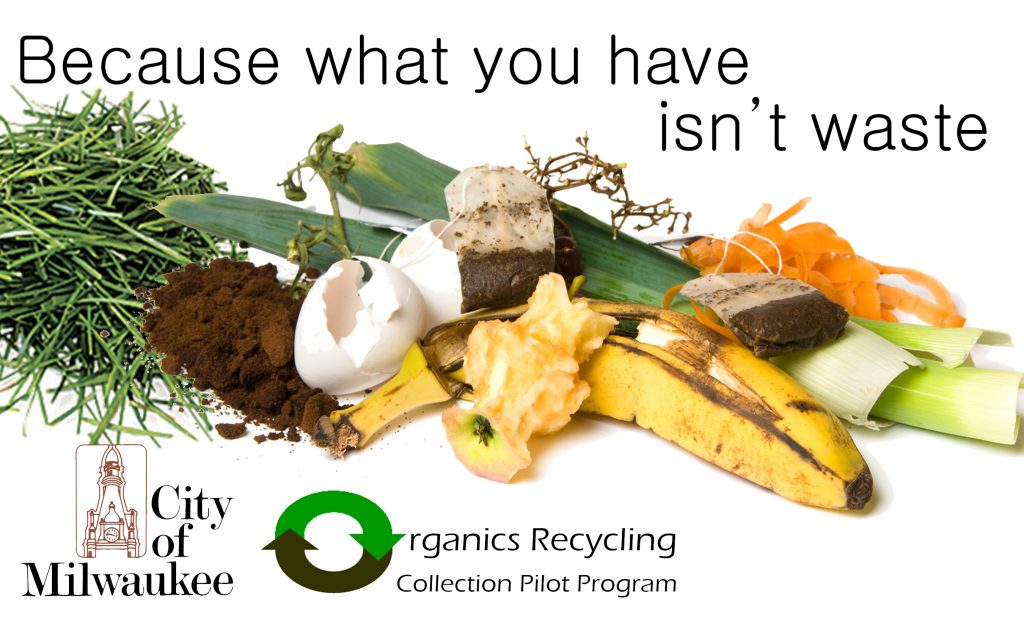City Wrong to End Composting Program
Other cities collect organic waste. Why is Milwaukee ending its program?
With no warning to its customers, the City of Milwaukee will be quietly ending its successful four-year Organics Recycling Collection Pilot Program, which has included all food and compostable food containers. On Jan 30th potential waste haulers received a Request For Proposal (RFP) from the MKE Department of Public Works (DPW). The new RFP is for a minimum of five years and does not mandate food waste to be picked up by the hauler. It is now only an option.
Where is the political will or farsighted leadership concerning organics diversion in MKE? Based on this RFP, the city is seeking a quick solution to end the compost pilot program. What about the longer term vision of:
- greening our city
- building entrepreneurship
- and city jobs (there is no requirement that the company employ MKE residents or be based in MKE)?
Landfill diversion goals, building healthy soils with nutrient-rich compost or supporting small businesses and local jobs are not reflected in any aspect of this RFP.
Contractors can now choose to pick up only yard waste, only food waste, or the two combined. This factor of choice is the primary concern of this op-ed. It appears that DPW hopes that a new contractor will be secured soon before any of their current customers from Bay View, Riverwest and the East Side know the existing program is ending. In fact, many other neighborhoods have wanted the pilot program to expand into their area. Proposals for this expansion are due March 6th.
At the close of 2018, Compost Crusaders raised an additional $10,000 to increase the size of the program by funding another 200 bins. To date there are only 540 bins that are part of the program. For over a year since this donation, the other 150+ bins have not been delivered. Still, there is a wait list.
This leads to the following questions:
1. Why have the additional bins not been delivered, even though there is a wait list?
2. What do current users think about the pilot program?
3. Why hasn’t there been a survey about the pilot program?
4. Why haven’t the users been told the program is ending?
The city is apparently not interested in the commitment that 500+ households have made over the last four-five years.
The cities of Seattle, New York, San Francisco, and Oakland all compost their compostable containers with their food waste. If DPW chooses a company that chooses not to compost food waste, our composting system would take three steps backwards for the next five years.
Many food-service businesses have chosen compostable containers as a solution to stopping the use of ‘forever plastic containers’ with all of its toxic consequences. A commercial composting system is required to compost this vegetable plastic (PLA). A garden-waste system is primarily carbon and cannot compost these containers: food waste (high in nitrogen) is required to break down these mostly carbon compostable products.
The new contract also requires the contractor to purchase all the bins, but at the end of five years the city owns the bins. All maintenance and loss/replacement incurred during the contract is also the responsibility of the contractor. This is an onerous expense for a small business that is also supposed to be quickly expanding the program throughout the city (35 percent of the decision is based on expansion). In the new proposal outline, only a large, organically-untrained company can easily cover the costs of not being able to depreciate these bins (the contractor won’t own them and also cannot acquire a loan against them) and is therefore more likely to receive the contract.
Fifty percent of DPW’s decision is based on cost to the user. Why would a contractor include food waste if doing so would impact their chance of being chosen? It is impossible to compete with a company only hauling garden waste if you are collecting a combined waste of food and garden.
Food waste is a significant contributor to garbage pickup and landfill in many communities. About a third of garbage waste is organic and much of that is food waste. Removing organic food waste will certainly help reach Milwaukee’s goal of reducing landfill use by 40 percent.
Bottom Line: Let’s Keep Food in our Organics Waste System! Please contact your alderman and the mayor to let them know that you want the organics collection service to mandate the pick-up of food waste!
Mary Lou Lamonda, co-founder Plastic-Free MKE and co-author of The Australian Compost and Worm Book.
Op-Ed
-
Unlocking Milwaukee’s Potential Through Smart Zoning Reform
 Jul 5th, 2024 by Ariam Kesete
Jul 5th, 2024 by Ariam Kesete
-
We Energies’ Natural Gas Plans Are A Mistake
 Jun 28th, 2024 by John Imes
Jun 28th, 2024 by John Imes
-
Milwaukee Needs New Kind of School Board
 Jun 26th, 2024 by Jordan Morales
Jun 26th, 2024 by Jordan Morales





















It appears that DPW hopes that a new contractor will be secured soon before any of their current customers from Bay View, Riverwest and East Side know the existing program is ending.
I’d say your hunch is correct on that…The normally very communicative channel from DPW has yet to say anything.
I just got into the program after previously sharing a cart with neighbors (they moved), If the hauler is willing to pick up, what’s DPW’s problem — administration costs too high? Then, like you suggest, implement online billing.
One GIANT Step for the big guys. and a slap to the community and the local efforts. Is Tosa ending their pilot also?
False alarm / hearsay, see: https://urbanmilwaukee.com/2020/02/19/city-hall-city-hopes-to-expand-composting/
In UM’s defense they’ve made it clear before that they publish op-eds verbatim. Nice to get some follow through with a real article later